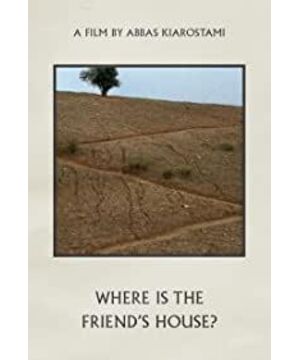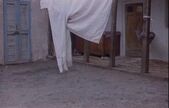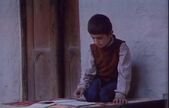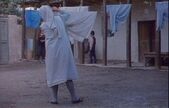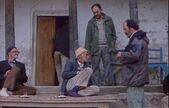(Text / Xiaoqi)
"Where Is My Friend's Home" is a children's film directed by Abbas Kiarostami. The film was filmed in 1987 and premiered at the Luoyingnuo Film Festival in 1989, and won the Cannes International Film Festival in the same year. Art Film Awards.
From the plot point of view, the story is very simple - in a mountain village elementary school in Iran, eight-year-old Ahmed took home Nemazadi's workbook by mistake, because he was worried that Nemazadi would be expelled from the teacher. Without knowing the exact address of his deskmate, he started running alone on the way to Posty. A group of long shots watched Amud climb the "zhi"-shaped slope in the open field and waited quietly for the child's back to drift away, and finally shrink to a tiny drop. Abbas believes: "A close-up does not mean that the subject is too close, and a long-range shot is also a close-up." Amud, who is running, is as weak as an ant in the vast natural landscape, but he is extremely tenacious, walking non-stop. moving on a long, winding road.
The process of finding Amud was not smooth sailing. The first obstacle was the pressure of discipline. When he offered to return the workbook, his mother just repeatedly emphasized "do your homework" and "obedience", and occasionally asked him to do some work. The chores of taking a baby bottle, cradle, and buying bread, the mother always turned a deaf ear to the appeal of sending the workbook. After several struggles, Ahmed rushed out of the house while his mother was not paying attention. Out of the simplicity and stubbornness of a child, Ahmed made a rebellion, and thus began his search.
In fact, the binary opposition of "discipline-resistance" runs through the entire narrative. The film begins with the teacher criticizing the students for "you don't know how to obey the rules." "It means that even the physical instinct of sneezing is not allowed, and there will be punishment for the slightest violation. In this way, the discipline of excessive force is deeply integrated into daily life. It is not only the teacher's deliberate training to "stand up and sit down", but also the "beating once every two weeks" in Grandpa Ahmed's mouth - even if there is no make mistakes. This kind of unequal discipline exists widely in the social structure and is placed in the relationship between adults and children. The strong party uses natural authority to suppress the personality of the weak party. They set "rules" for numbness and unreasonableness. shell, and thus openly regard spiritual castration as a creed. Through what Amud saw and heard, what we saw was a poor environment, a social atmosphere with low desires, and a general spiritual asceticism, all of which slaughtered people's nerves, and the purity of children was like a The fresh air that penetrated the gaps in the grille temporarily broke the monotony and silence.
As the leader of new Iranian films, Abbas is known as "the Asian film director with the most oriental spirit after Akira Kurosawa". He takes care of children's inner world and also brings introspection to the Islamic nation. In the film, the successive ethics of Gangchang are full of justice that only belongs to adults - teachers do not trust students, Amud's mother thinks that he just wants to go out to play, and children are repeatedly told to unconditionally believe in adults. At the end of the 20th century, technological progress brought about huge social changes. Time-consuming wooden windows and doors were quickly replaced by sturdy iron doors. Young people flocked to the city. Ancient traditions derived from the teachings of the Koran suffered. In the face of the violent impact and the collapse of the social value system, Abbas constructed a fable about "searching" from the perspective of Muslims, and tried to explore the place of spiritual conversion through the eyes of children.
The second dilemma faced by Ahmed is the communication gap caused by aphasia. In the context of the complete separation of the adult world and the children's world, the two sides cannot communicate effectively. The bald businessman tore a page from the child's tightly guarded workbook, only to lose his voice when Amud asked anxiously "Are you Mr. Muhand?" No one wanted to hear Amud speak, whether it was The businessmen who are trying to sell iron gates are still the women who sell apples. They only focus on expressing what they want to express, and they selectively block the feedback information.
Amud set off again and again with wrong or vague information, wandering through buildings and alleys, and at a fork in the road, he met an equally confused cow. Amud, who is struggling to find people with only a general place name, can not help but remind people of Fanka in Chekhov's novels. Xiaofanka's letter to his grandfather also only has a name and an extremely vague address called "countryside". A letter full of wishes cannot be delivered, and the gap between adults and children also makes this search doomed to fail. After all, Ahmed can only go back and forth in vain between the two places that are far apart. not get.
Fortunately, in the row of closed iron doors, there is still a wooden window willing to open for him, although the two people who are warming each other - the old man who lives by traditional carpentry and Ahmud who is a child both carry them. The attributes of marginalized and disadvantaged groups, fortunately, the mild light leaking from the window is enough to break the darkness of the lost ground. As Abbas said: "We are pessimists, but we cannot live without hope."
At the end of the film, Ahmed, who returned home, finished his homework for his deskmate and finally saved him from punishment. Some people wondered why he didn't do it in the first place? Why bother looking for it. But children are always more stubborn than imagined, adults prefer proper and careful balance, and children are obsessed with the simplest ideas, and what they identify is the whole world. The reason for the tears may be a sugar, a rabbit Even a small expression, a smirk, they feel everything they can seriously and delicately, and the busy adults may just think the crying is disturbing and scolded to shut up. In another Iranian children's film "Little Shoes," Ali was frustrated after winning a long-distance race because he ran as fast as he could to promise a pair of sneakers for his sister, but that was the third-place prize. Ahmed's run is also a fairy tale for adults.
Growing up makes people learn to give orders, but forget how to listen; people know how to make a profit and make a living, but bury the shadow that was once weak and helpless in the depths that cannot be found. Once again, as an imprint, we are passed on again. As childhood grows old, we gradually become silent, framed by daily discipline and dogma, and silently fade into an indifferent body of interest in the passing time. . For Amud's grandfather, he may have been such a child a few decades ago - he was obedient in the face of adults, until he was once courageous because of the light he cherished when he was young, and he also resisted, cried, and was punished. However, it's just that the dragon slayer eventually becomes a dragon. When he sits on the stone steps with a wrinkled face and talks about the way of education, he will neither gain sympathy from the running Amud nor give him any help. Sun Tzu understood, he just ordered in a tough, learned tone: "Go get me a cigarette, Amud."
……………………………………
Welcome to WeChat Official Account: The Seventh Wave
View more about Where Is the Friend's House? reviews


